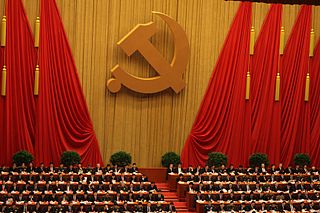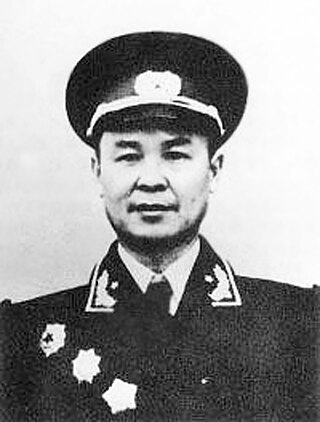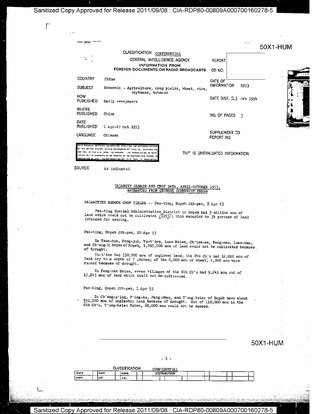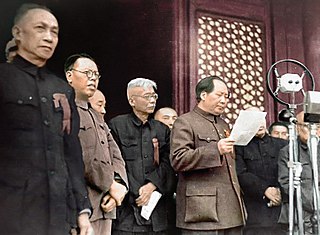Generations of Chinese leadership is a term historians use to characterize distinct periods of the leadership of the Chinese Communist Party (CCP) and, by extension, successive changes in the ideology of the CCP. Historians have studied various periods in the development of the government of the People's Republic of China (PRC) by reference to these "generations".

Xu Xiangqian was a Marshal of the People's Republic of China (PRC). He was the son of a wealthy landowner, but joined the Kuomintang's (KMT) National Revolutionary Army (NRA), against his parents' wishes, in 1924. When the Chinese Civil War started in 1927, Xu joined the Eyuwan Soviet led by Zhang Guotao; Xu became commander of the Eyuwan-based Fourth Red Army. Zhang and Xu retreated to northern Sichuan after being defeated by a KMT encirclement campaign. Xu politically survived Zhang's defection to the KMT in the late-1930s; he rejoined the Red Army in a less senior position under the leadership of Mao Zedong.

Li Desheng was a general in the Chinese People's Liberation Army. He was born in Xin County, Henan, China, an area now known as the "Cradle of Generals" for the large number of senior military officers born in the region. He joined the Chinese Workers' and Peasants' Red Army at the age of 14, in 1930, the Communist Youth League in 1931, and the Chinese Communist Party a year later. He attained the rank of major general in 1955, and general in 1988. The patterns of Li's advancement suggest that he was mentored by Chen Xilian, and that he was closely aligned with You Taizhong. Li Desheng served on the Politburo of the Chinese Communist Party from 1969–1985, one of the most turbulent periods of the People's Republic. He died in Beijing on 8 May 2011.
The 12th Central Committee of the Chinese Communist Party was in session from September 1982 to November 1987. It held seven plenary sessions. It was succeeded by the 13th Central Committee. It elected the 12th Politburo of the Chinese Communist Party in 1982.
The 8th Central Committee of the Chinese Communist Party was in session from 1956 to 1969. It was preceded by the 7th Central Committee of the Chinese Communist Party. It held 12 plenary sessions in this period of 13 years. It was the longest serving central committee ever held by the Communist Party.
The Politics of Hunan Province in the People's Republic of China is structured in a dual party-government system like all other governing institutions in mainland China.

Xu Shiyou was a general in the Chinese People's Liberation Army.

Qin Jiwei was a general of the People's Republic of China, Minister of National Defense and a member of the Chinese Communist Party Politburo.

Chen Xilian was a Chinese military officer and politician, general of the People's Liberation Army. A prominent Maoist, he held very important positions in both military and political spheres.

The 18th National Congress of the Chinese Communist Party was held November 8-15, 2012 at the Great Hall of the People. It was preceded by the 17th National Congress of the Chinese Communist Party. Due to term limits and age restrictions, seven of the nine members of the powerful Politburo Standing Committee (PSC) retired during the Congress, including Hu Jintao, who was replaced by Xi Jinping as General Secretary of the Chinese Communist Party. The Congress elected the 18th Central Committee of the Chinese Communist Party, and saw the number of Politburo Standing Committee seats reduced from nine to seven. It was succeeded by the 19th National Congress of the Chinese Communist Party.

Wei Guoqing was a Chinese government official, military officer and political commissar of Zhuang ethnicity. He served as the Chairman of Guangxi from 1958 to 1975 and on the Chinese Communist Party's Politburo (1973–1982) and as Director of the People's Liberation Army's General Political Department (1977–1982). Wei was one of the few members of the 9th, 10th, 11th and 12th Central Committees (1969–1987) and the 10th through 12th politburos not purged during the Great Proletarian Cultural Revolution (GPCR) or Deng Xiaoping's backlash. He was also a Vice Chair of the National People's Congress Standing Committee (1975–1989) and of the Chinese People's Political Consultative Conference (1964–1983).
The Wu Chinese people, also known as Wuyue people, Jiang-Zhe people (江浙民系) or San Kiang (三江), are a major subgroup of the Han Chinese. They are a Wu Chinese-speaking people who hail from southern Jiangsu Province, the entirety of the city of Shanghai and all of Zhejiang Province, as well as smaller populations in Xuancheng prefecture-level city in southern Anhui Province, Shangrao, Guangfeng and Yushan counties of northeastern Jiangxi Province and some parts of Pucheng County in northern Fujian Province.

Events in the year 1953 in China.

Xu is a Chinese-language surname. In the Wade-Giles system of romanization, it is spelled as "Hsu", which is commonly used in Taiwan or overseas Chinese communities. It is different from Xu, represented by a different character.
Events from the year 1969 in China.
Marshal Peng Dehuai is a 2016 Chinese biographical historical drama television series directed by Song Yeming and written by Ma Jihong, Gao Jun and Xu Jiang, based on the life of Peng Dehuai (1898-1974), a prominent Chinese Communist military leader during the 20th century. The series stars Dong Yong as Peng Dehuai, alongside Yang Tongshu, Tang Guoqiang, Liu Jing, Wang Wufu, and Luo Gang.

The proclamation of the People's Republic of China was made by Mao Zedong, the Chairman of the Chinese Communist Party (CCP), on October 1, 1949, in Tiananmen Square in Beijing. The government of a new state under the CCP, formally called the Central People's Government, was proclaimed by Mao at the ceremony, which marked the foundation of the People's Republic of China.










